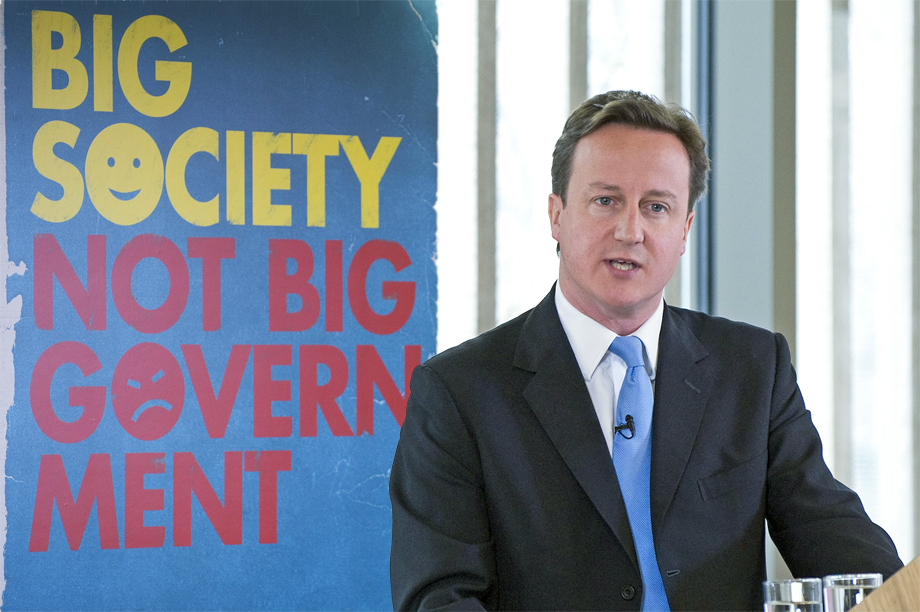From Big Society to Meme Culture: from the Radical to the Performative

The slogan that advertised the flagship policy of the Conservative Party in the 2010 general election read ‘Big Society not Big Government’. A few months later in Liverpool, Prime Minister David Cameron reaffirmed his great passion for this powerful idea, ‘The Big Society is about a huge culture change… where people, in their everyday lives, in their homes, in their neighbourhoods, in their workplace… don’t always turn to officials, local authorities or central government for answers to the problems they face… but instead feel both free and powerful enough to help themselves and their own communities. It’s about liberation – the biggest, most dramatic redistribution of power from elites in Whitehall to the man and woman on the street. And this is such a powerful idea for blindingly obvious reasons.’
Cameron did not make explicit in his Big Society agenda what kind of power would be redistributed from the elites in Whitehall, focusing instead on “liberation” and individual power as ways to change culture. Big Society was an attempt to hegemonise culture through consent.
Successive and current UK and devolved governments have benefited from this method, themselves utilising cultural accommodation in an attempt to achieve hegemony of culture. Cultural accommodation relies upon consent, drawing from non-dominant cultures without allowing any significant impact to be made on central ideas and beliefs. From the ways in rural towns are experiencing similar aggressive gentrification processes as neighbourhoods within big cities, this can be seen across civic Scotland. As subordinate groups and their cultures see elements of themselves in the hegemonic culture, they do not confront a pure class culture. In turn, having co-opted cultural elements of the subordinate groups, the bourgeois culture stops being a pure bourgeois culture. By also co-opting lived experiences of the subordinate group, dominant groups can again gain consent to cultural hegemony via co-operation.
This for example, According to Stuart Hall, “It works primarily by inserting the subordinate class into the key institutions and structures which support the power and social authority of the dominate order. It is, above all, in these structures and relations that a subordinate class lives its subordination.”.
Ten years on from Cameron’s Big Society not Big Government, we find ourselves in a world where the commodification of grassroots and liberatory practices continues to be done by political institutions, movements and individuals as well as brands.
In recent times, the visibility of Black feminists such as bell hooks and Audre Lorde has undeniably increased. Though recognition of works by Black women thinkers are always welcomed, by reducing radical theory into mere catchphrases, this demonstrates an inability to take Black Feminist thought seriously. Whilst Francesca Sobande writes of brands as ‘not activists, altruistic or “allies”, despite their efforts to suggest otherwise via strategically crafted campaigns, social media content and corporate social responsibility agendas’, the same could also be said of political institutions, movements and individuals, whose engagement of works by Black feminists seldom go beyond a performance of wokeness.
Community Transmission
Across political and personal lines, more time is being devoted to upholding inadequate (re)interpretations of identity politics – and intersectionality. Such interpretations are often rooted in the belief that identity consciousness is a selfish political theory – whose origins are usually located in the neo-liberal academy or marketing strategies of profit-making organisations – which seek to diminish ‘real politics’ and issue-based movements, as they are centred on the self.
Identity politics has its roots in an expansive and radical agenda. In the mid-1970s, a group of Black feminist scholars and activists began meeting in Boston to address the political concerns of black women, which they felt had been ignored by the larger feminist movement. They called themselves the Combahee River Collective and in 1977, issued “A Black Feminist Statement”. Having found that the feminist movement and other groups—including Black power and civil rights – were lacking in their approach to ending the oppression of Black women and women of colour, the collective wrote:
“We realize that the only people who care enough about us to work consistently for our liberation is us. … This focusing on our own oppression is embodied in the concept of identity politics. We believe that the most profound and potentially the most radical politics come directly out of our own identity, as opposed to as opposed to working to end somebody else’s oppression.”

The original intent of identity politics was to articulate Black women’s struggle at the nexus of race, gender, sexual, and class oppressions and then form strategies for dismantling each of these, both in black feminist spaces and in coalition with other groups. When we refuse to acknowledge the origins of a term – in this case, working towards being recognised as beings and collective liberation – we end up with the current narrative of identity politics. The type which believes it is highly individualistic and diminishing of real politics.
Leftist interpretations of identity politics and those which reduce arguments to economic causes and the economic struggle of class, do little to add to the debate. As A. Sivananadan puts it:
“Western working class movements have belied their own class experience by refusing to re-assess both their class instinct and their class position in the light of new historical forces, especially the forces of revolution removed from their own.”
Interpretations such as those highlighted, lack context and understanding in which the theory was formed by the Combahee River Collective and fail to engage with the political forces and interests – both state and ruling class – which continue to create and shape those identities.
Any movement – including the Scottish Independence movement – has to acknowledge we have varied identities and be able to relate to these specific experiences – including our own. We should seek to do this in the ways in which they were intended, or we remain at risk of pursuing, yet another powerful idea which refuses to liberate all people.

This article sparks many exciting points of discussion, not least the point that, like that of the Big Society, the Independence agenda doesn’t specify what kind of power would be redistributed from the elites in Whitehall, to whom, and to what extent. That matter seems to have been kicked into the long grass, at least until after the referendum that will transfer yon power to the elites on Calton Hill.
It also reveals the problem of reflexivity: the Big Society does indeed smuggle in libertarianism under a cloak of equality and impartiality. The unexamined assumption is that power in the Big Society is to be redistributed to atomised abstract individuals or ‘citizens’ and arithmetical associations thereof, rather than to the organic communities in which our concrete identities as ‘women’, ‘Scots’, ‘transexuals’, ‘Muslims’, etc., can alone be realised; an idea that’s alien to many of the identities who would be captured and dissolved as ‘brands’ in the dominant Big Society narrative of consumer choice.
The question for libertarians is: How can you subvert and overcome the reflexivity that ultimately deconstructs your libertarianism? Why should the market politics of Big Society civic republicanism be privileged over identity politics, when such privileging would be no less hegemonic than would be the anglicisation of Gaelic placenames or the gentrification of Leith or the commodification of grassroots and liberatory practices?
I think David Cameron was trying to raise a Stasi-like system of neighbourhood informants on the cheap, along with a poorly-overseen charity-sector replacement for those government services that corporations disdained as unprofitable. All these issues have come to a head since, especially during the Covid-19 pandemic.
As far as I can tell, the Combahee River Collective concerns are historically valid, and we see the pattern in the 1789 French Revolution where the women who participated were betrayed, and Liberty for enslaved black people was half-baked (and the revolutionary Haitians had to fight superpowers to gain theirs). Although interestingly the extensions of suffrage in the UK over the period from 1819’s Peterloo Massacre (of peacefully-protesting men, women and children) to the final enfranchisment of adult women in 1928 let to ever more enfranchisement, even though it took a great deal of time to overcome the reactionary forces (led by the Royals and the Lords).
However, even the Collective’s text shows that identity politics can be the politics of oppression, at the top or on any rung of society overbearing another. Black men oppress black women, lesbians pitch their struggle separately, white feminists don’t deal well with their own racism (is the charge). One of the most oppressive forms of identity politics in the UK is (and has been historically), if I have understood the framework correctly, the aristocratic element, peaking towards royalty (that enshrinment of the superior value of nepotism). I am currently reading Engines of Privilege: Britain’s Private School Problem by Francis Green and David Kynaston, and identity seems very much part of the problem, to an almost caste-like degree. And the picture may been getting even worse (far from the system withering away, the Cabinet is packed with the privately-educated, and the numbers of elitely-educated in the already over-stuffed diplomatic service seem to be increasing just as its worldwide reputation takes a nosedive).
It was certainly, like Blair’s communitarianism before it, a blast of the trumpet against the monstrous regiment of collectivist socialism/state capitalism. The problem with both was that the pious words weren’t accompanied by any real dismantling of the state in favour of communities.
@Foghorn Leghorn, communities too small and disorganised to do anything about the real-world threats handily spelled out by the Bulletin of Atomic Scientists:
Nuclear Risk, Climate Change, Disruptive Technologies, COVID-19 (and so on)
https://thebulletin.org
Of course, what government failure, abdication and corruption produced was the likes of Extinction Rebellion.
Right enough, we should leave it to the big centralised states to handle those global issues for us, because they’re so… well, big and centralised.
Would a big decentralised society (ideally, a big decentralised global society, instead of the current rammie of sovereign states), governed by the principle of subsidiarity, do a worse job?
@Foghorn Leghorn the Bulletin of Atomic Scientists and Extinction Rebellion are international organisations, possibly more decentralised than most, not state-aligned.
https://rebellion.global/press/2020/09/01/global-rebellion/
Yes, I know. But you were saying that ‘communities [are] too small and disorganised to do anything about the real-world threats’.
BTW, the Bulletin of Atomic Scientists and Extinction Rebellion are both communities of interest. Are they too small and disorganised to do anything about the real-world threats? Do they not feed into larger voluntary associations (‘communities’) that are governed by the principle of subsidiarity?
I struggled to understand what this article was actually about when I first read it but upon re-reading (and re-reading) I was in slightly in awe. I don’t know how Layla-Roxanne is able to connect so many different ideas and thoughts but I’m glad to know there are thinkers like her(?) in Scotland. Thank you.
Excellent article! Can you ask Layla what her thoughts are on co-option of radical movements?